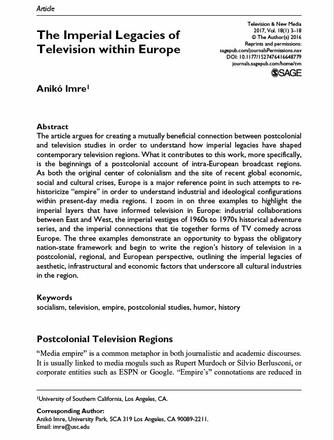
The study analyses the imperial layers that have informed television in Europe through industrial collaborations between East and West, the imperial vestiges of 1960s to 1970s historical adventure series, and the imperial connections that tie together forms of TV comedy across Europe. According to the study, these three examples showcase an opportunity to avoid the obligatory nation-state framework and start writing the region’s history of television in a postcolonial, regional, and European perspective, outlining the imperial legacies of aesthetic, infrastructural, and economic factors that characterise all cultural industries in the region.
The study states that these vignettes about the imperial roots of socialist TV bring out the afterlife of this heritage in contemporary media cultures. Considering “region” transnationally, transhistorically, and comparatively, they open up even more directions. In this context, “television” is perceived by the author not only as a collection of content, but also as the multiple national and transnational institutions, technologies, viewing platforms, and participatory options that make television an elusive and comprehensive medium. Moreover, television is regarded as an archive of material and institutional histories of popular media that are mired in unacknowledged ideological struggles.
According to the study, intra-colonial history is impossible to ignore any longer in light of what is generally seen as the failure of post–Cold War Europe to integrate within the European Union’s family of unity and diversity. The findings of the study show that, in the hands of semi-authoritarian leaders, discontent with the European Union has also served as a political platform for populist nationalism. Nationalism, being rooted in the fear of others, has further inoculated racism, xenophobia, and other exclusionary sentiments.
The article analyses the thorough, systematic interlacing of the experience of external oppression with internal repression and the political-economic and subjective-psychological experiences of colonialism in the former Soviet empire, offering an alternative historiography to hegemonic nationalistic narratives within a historical context that accounts for the region’s multiple imperial legacies. In this framework, television facilitated cultural identification with Nordic Europe, reestablishing the Baltic region’s older imperial ties with Scandinavia in a quest for independence from the Soviet Empire. The study finds that the postcolonial schizophrenia over television’s value, which is most apparent in viewer memories of socialist TV, is split into post-socialist nostalgia and formal, public expressions in print, in interviews. Furthermore, the imperatives of public service broadcasting that determined the attributes of Western radio and television were largely shared by Soviet socialist initiatives.
The author suggests that the neglected status of both postcolonial and television studies in relation to European, particularly Eastern European, cultures is a hidden asset. The written form of the region’s history of television in a postcolonial, regional, and European perspective would provide crucial ingredients for and a critical backdrop to existing models that describe global television systems in terms of syncretism, hybridity, competing modernities, and mixed temporalities.
Tags: EU Member States Public broadcastingThe content of this article can be used according to the terms of Creative Commons: Attribution-NonCommercial 4.0 International (CC BY-NC 4.0) . To do so use the the wording "this article was originally published on the Resource Centre on Media Freedom in Europe" including a direct active link to the original article page.

